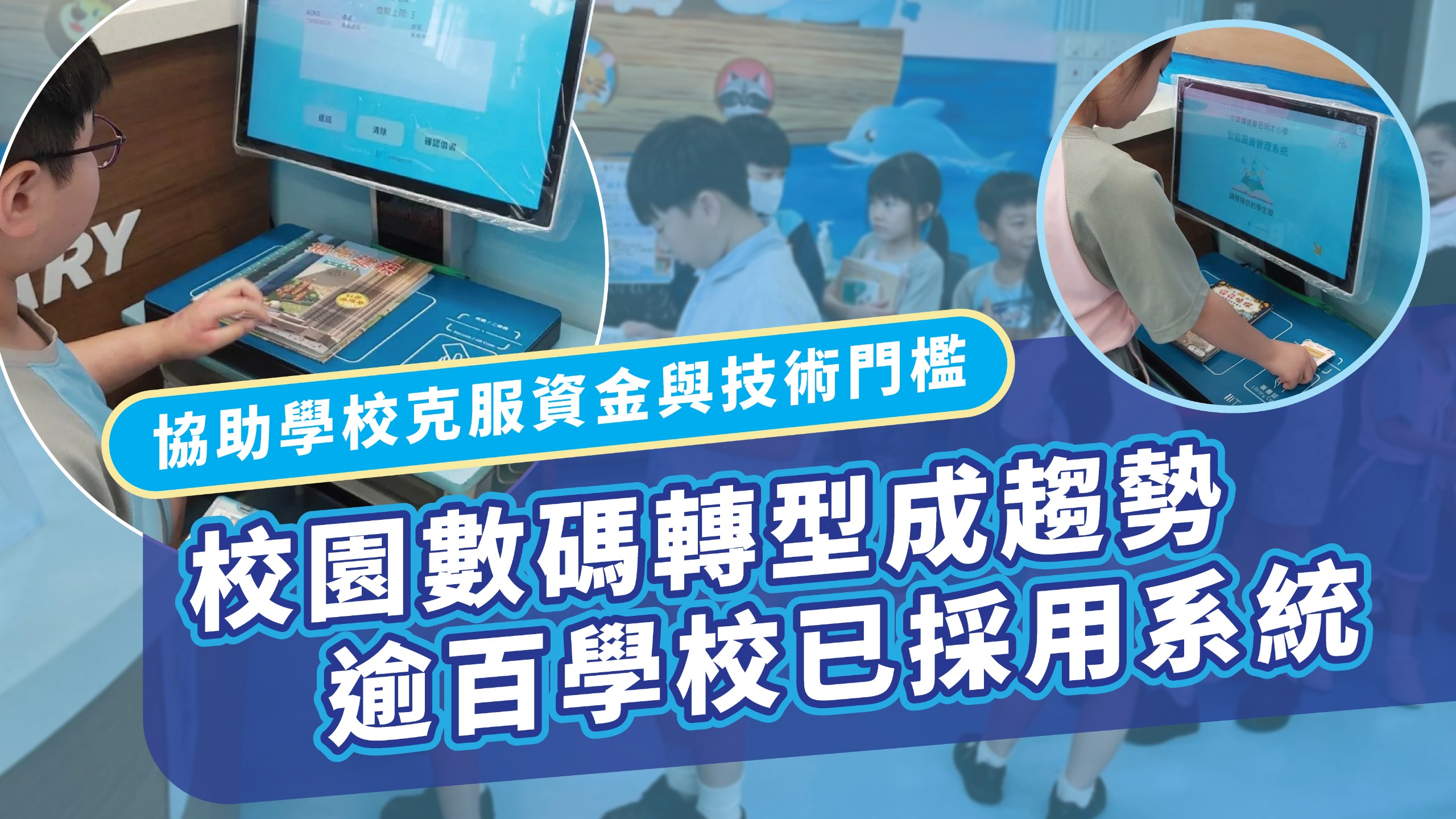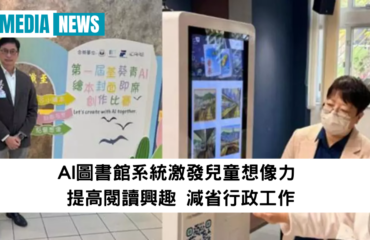教育局正推動科技教育及STEAM發展,本地學校亦加快圖書館數碼化的步伐。據業界最新估算,全港約有150間學校圖書館已升級採用RFID技術營運及管理方案,當中服務商Million Tech佔據逾半(53%)、超過80間學校市場份額,較2022年的6間激增逾12倍,此增長亦反映學校積極響應政策,將科技應用融入圖書館管理日常,以優化學生閱讀環境。

目前除一般以自有資金或辦學團體支援推動學校的轉型外,教育局自2018年5月起亦透過「優質教育基金」(QEF)的《公帑資助學校專項撥款計劃》渠道支援學校升級設施,部分成功運用QEF資助全面升級圖書館設施,包括進行重建裝修連配備智能系統;另亦有學校透過「推廣閱讀津貼」獲得補貼協助。有獲資助的津貼小學圖書館主任表示:「QEF申請需時約6至8個月不等,但RFID系統上線後,盤點效率可提升逾80%,長遠節省的人力成本遠超預期。」
善用教育資金分階段轉型
為協助學校克服資金與技術門檻,業界建議分三步走:
1. 評估需求:與專業供應商合作,優先為圖書或貴重設備如平板電腦或電子閱讀器等導入RFID標籤。
2. 模組化擴充:從基礎方案(如盤點槍、自助借還書機)起步,後續逐步加裝智能書櫃,甚或物資管理模組等。
3. 整合資源:結合QEF、校本IT預算及辦學團體支援,分散財務壓力。
其中,中華傳道會呂明才小學自2019年起規劃多項數碼化目標,並透過QEF資助逐步落實各項措施,去年更導入RFID智能圖書館系統。梁漢基校長指出:「系統能將圖書盤點時間縮短,過去需3周的盤點工作,現縮短約3天內完成,人力成本節省逾75%。另外,開放學生自助借還書,培養自主學習能力,並提升借閱效率,間接推動學生閱讀風氣。」該校的圖書館主任馮梓媚老師亦強調,系統操作技術門檻低,教師容易上手。

Million Tech Smart Education總監葉詠恩表示:「方案支援模組化擴充,曾有學校分兩年撥款,首年先以基礎設備(如RFID圖書標籤、盤點槍)起步,次年再逐步擴充結合智能借還書櫃及資產管理等,過程無需中斷日常運作,亦減輕初期成本壓力。」
未來展望:2026年覆蓋率或突破30至40%
業界預測,若維持現有增速,2026年全港採用RFID圖書館方案的學校將有機會達300至450間。Million Tech呼籲學界把握資源,及早規劃數碼轉型,為師生打造更高效和互動的閱讀環境。此外,其亦正積極推出Library Go平台,整合個人化推薦書及閱讀數據追蹤功能,既能精準匹配學生興趣,也協助校方簡化管理流程,預示「智能閱讀生態」將成教育科技下一階段發展重心,以同步應對崛起的AI應用熱潮。
原文連結:【Recruit】校園數碼轉型成趨勢 逾百學校已採用RFID智能圖書館系統
更多連結:
English verion:
Campus Digital Transformation Gains Momentum: Over 100 Hong Kong Schools Adopt RFID Smart Library Systems
As the Education Bureau actively promotes technology education and STEAM development, local schools are accelerating the digitalization of their libraries. According to the latest industry estimates, approximately 150 school libraries in Hong Kong have upgraded to RFID-powered operation and management solutions. Among service providers, Million Tech dominates over half (53%) of the market, serving more than 80 schools — a surge of over 12-fold since 2022 (when it served just 6 schools). This growth reflects schools’ proactive response to government policies in integrating technology into daily library management, optimizing student reading environments.
Funding Support Drives Upgrades
Beyond schools using their own funds or support from sponsoring bodies, the Education Bureau has facilitated digital transformation through the Quality Education Fund (QEF) under the “Targeted Support for Publicly-funded Schools” scheme since May 2018. Some schools secured QEF grants for full-scale library renovations, including rebuilding spaces and deploying smart systems. Others utilized “Reading Grant Subsidies.” A library coordinator from a subsidized primary school noted:
“The QEF application takes 6–8 months, but post-RFID implementation, inventory efficiency increased by over 80%. Long-term savings in labor costs far exceeded expectations.”
Phased Transformation Strategy
To help schools overcome funding and technical barriers, the industry recommends a three-step approach:
- Needs Assessment: Partner with providers to tag books and high-value assets (e.g., tablets, e-readers) with RFID labels.
- Modular Expansion: Start with basics (handheld scanners, self-checkout kiosks), then add smart bookshelves or asset management modules.
- Resource Integration: Combine QEF grants, school IT budgets, and sponsoring body support to distribute financial pressure.
Case Study: Efficiency Gains in Action
C.C.C. Yuming Primary School implemented digitalization goals since 2019 using QEF funding, adding an RFID smart library system in 2023. Principal Leung Hon-kei emphasized:
“Inventory time dropped from 3 weeks to under 3 days, cutting labor costs by 75%. Self-checkout fosters student autonomy and boosts borrowing efficiency, indirectly promoting reading culture.”
Teacher Fung Tsz-mei, the library coordinator, added that the system’s low technical threshold allows easy adoption by staff.
Scalable Solutions for Budget Flexibility
Ip Wing-yan, Director of Million Tech Smart Education, explained:
“Our modular approach lets schools phase investments. One school used Year 1 funding for RFID tags and scanners, then expanded in Year 2 with smart bookshelves and asset management — all without disrupting operations.”
Future Outlook: 30–40% Adoption by 2026
The industry projects 300–450 Hong Kong schools will adopt RFID solutions by 2026 if current growth continues. Million Tech urges schools to leverage resources for early digital planning, creating efficient, interactive reading spaces. The company is also launching Library Go, a platform featuring personalized book recommendations and reading analytics to match student interests and streamline management. This signals the rise of “smart reading ecosystems” as the next focus in EdTech, aligning with emerging AI applications.




